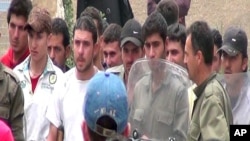WASHINGTON - Syrian pro-government militiamen known as the "shabiha" are facing international scrutiny for their alleged role in the May 25 massacre of more than 100 civilians in the central Syrian town of Houla.
U.N. peacekeeping chief Herve Ladsous said there are "strong suspicions" that shabiha gangs were responsible for the summary execution of dozens of men, women and children in their homes last week. Houla residents told visiting U.N. observers and reporters that they watched the shabiha carry out the killings.
In Syria, the term shabiha initially referred to shadowy gangs of smugglers around the seaside city of Latakia in the 1970s.
Opposition activists say Syria's ruling Assad family has used the gangs to engage in criminal activities for decades, paying them with government funds and providing them immunity from prosecution.
In the past, most shabiha members came from coastal regions such as Qardaha, dominated by the Assad's family's minority Alawite sect.
Militia expands role
But activists say the focus and membership of the shabiha have changed since the start of Syria's 15-month uprising against President Bashar al-Assad.
Hozan Ibrahim, a Berlin-based member of the main opposition Syrian National Council, told VOA that pro-Assad gangs have become a government tool for suppressing protests and killing people in rebellious towns and villages.
Ibrahim also said the government has recruited militiamen from all of Syria's ethnic and sectarian groups. "We can find [majority] Sunnis, Alawites, Druze [in the shabiha] - whoever is loyal to the regime," he said.
The Syrian government denies operating any militias. It also is not clear how gang members are paid.
Ibrahim said businessmen loyal to President Assad pay the shabiha on behalf of the government. Lina Tibi, a Syrian National Council member in Cairo, said witnesses have told her the shabiha receive funds directly from police stations.
"The regime keeps telling Alawites that if Bashar is gone, the Sunni people will kill you," she said. "So Alawite gangs defend themselves through rape and killing."
Government aids militias
Activists say the Syrian government wields great influence over the shabiha.
At pro-Assad rallies, Tibi said the militiamen often chant President Assad's first name, Bashar, pledging to give their souls for him and for his father and predecessor, Hafez al-Assad.
"We also have many videos showing the shabiha having weapons in their hands and police or army standing next to them," she said. "Why don't [the security personnel] take the weapons from them? Because they are working together."
Opposition members say the Assad government also has been encouraging the shabiha to engage in sectarian attacks in the hope of transforming the conflict and weakening the opposition.
Most of the Houla massacre victims were residents of Sunni villages. Survivors blamed militiamen from neighboring Alawite communities.
Ibrahim said the Syrian government has been trying to spread the idea that the uprising is a "real threat" to the Alawites and to all loyalists.
"That's why we see that regime loyalists are very violent in their response," he said.
U.N. peacekeeping chief Herve Ladsous said there are "strong suspicions" that shabiha gangs were responsible for the summary execution of dozens of men, women and children in their homes last week. Houla residents told visiting U.N. observers and reporters that they watched the shabiha carry out the killings.
In Syria, the term shabiha initially referred to shadowy gangs of smugglers around the seaside city of Latakia in the 1970s.
Opposition activists say Syria's ruling Assad family has used the gangs to engage in criminal activities for decades, paying them with government funds and providing them immunity from prosecution.
In the past, most shabiha members came from coastal regions such as Qardaha, dominated by the Assad's family's minority Alawite sect.
Militia expands role
But activists say the focus and membership of the shabiha have changed since the start of Syria's 15-month uprising against President Bashar al-Assad.
Hozan Ibrahim, a Berlin-based member of the main opposition Syrian National Council, told VOA that pro-Assad gangs have become a government tool for suppressing protests and killing people in rebellious towns and villages.
Ibrahim also said the government has recruited militiamen from all of Syria's ethnic and sectarian groups. "We can find [majority] Sunnis, Alawites, Druze [in the shabiha] - whoever is loyal to the regime," he said.
The Syrian government denies operating any militias. It also is not clear how gang members are paid.
Ibrahim said businessmen loyal to President Assad pay the shabiha on behalf of the government. Lina Tibi, a Syrian National Council member in Cairo, said witnesses have told her the shabiha receive funds directly from police stations.
"The regime keeps telling Alawites that if Bashar is gone, the Sunni people will kill you," she said. "So Alawite gangs defend themselves through rape and killing."
Government aids militias
Activists say the Syrian government wields great influence over the shabiha.
At pro-Assad rallies, Tibi said the militiamen often chant President Assad's first name, Bashar, pledging to give their souls for him and for his father and predecessor, Hafez al-Assad.
"We also have many videos showing the shabiha having weapons in their hands and police or army standing next to them," she said. "Why don't [the security personnel] take the weapons from them? Because they are working together."
Opposition members say the Assad government also has been encouraging the shabiha to engage in sectarian attacks in the hope of transforming the conflict and weakening the opposition.
Most of the Houla massacre victims were residents of Sunni villages. Survivors blamed militiamen from neighboring Alawite communities.
Ibrahim said the Syrian government has been trying to spread the idea that the uprising is a "real threat" to the Alawites and to all loyalists.
"That's why we see that regime loyalists are very violent in their response," he said.




